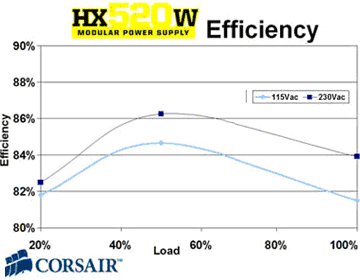What is the 80 PLUS initiative?
Conceived back in 2004 and brought to market just a year later, the 80 PLUS initiative is one of many standards introduced in an effort to increase energy efficiency in modern technology. Targeting computer power supplies, it awards PSUs that are able to achieve an energy efficiency of over 80 per cent at varying workloads and a power factor of 0.9 or more at 100 per cent load.
In basic terms, the knock-on effect of greater efficiency is lower electricity bills, the production of less heat and consequently better component reliability.
Manufacturers have of course been eager to adopt the 80 PLUS accolade, and since the initiative's inclusion in the Energy Star specification for computers in 2007, over 1,000 power supplies have been awarded the 80 PLUS certification - making it a clear industry standard.
And, with numerous power-supply models vying for energy-efficient accolades, the 80 PLUS standard has evolved in recent years to include a wider range of certifications. In addition to the original 80 PLUS certificate, 80 PLUS Bronze, Silver, Gold and Platinum awards have all been introduced to reflect power supplies capable of achieving efficiency ratings of up to 94 per cent.
How is 80 PLUS efficiency calculated?
The percentage efficiency of a computer power supply (I) is calculated by dividing the converted direct current being used by the power supply (DC) by the alternating current delivered to the unit from the mains (AC).
Using the formula, we can determine that a 500-watt power supply rated at 60 per cent efficiency would draw 833.3W from the mains and waste a substantial 333.3W as heat. In comparison, a 500-watt power supply rated at 85 per cent efficiency would consume only 588.2W of mains power, ensuring only 88.2W is wasted as heat.
Sounds logical, but there's more to it than that. A power supply's efficiency will vary under different loads, and generally speaking, power supplies are less efficient at low and maximum loads, as depicted in the efficiency graph of a 520W Corsair power supply, below.

With the greatest efficiency achieved at roughly 50 per cent load, manufacturers often recommend purchasing a power supply capable of delivering double the typical power output of your machine. Although the up-front cost of larger power supplies is higher, running a system at peak efficiency has its long-term benefits.
What are the different 80 PLUS certifications?
As of late 2010, there are five unique 80 PLUS certifications - each of which requires varying levels of efficiency at 20, 50 and 100 per cent load.
The most basic and original certification - 80 PLUS - is awarded to any power supply capable of achieving at least 80 per cent efficiency at the three defined workloads. An 80 PLUS Gold certification, meanwhile, can only be awarded to power supplies capable of achieving 88 per cent efficiency at 20 per cent load, 92 per cent efficiency at 50 per cent load and 88 per cent efficiency at 100 per cent load
All five standards are defined as follows:
| 80 PLUS | 80% | 80% | 80% |
| 80 PLUS Bronze | 81% | 85% | 81% |
| 80 PLUS Silver | 85% | 89% | 85% |
| 80 PLUS Gold | 88% | 92% | 88% |
| 80 PLUS Platinum | 90% | 94% | 91% |
You might be ready to go out and buy an 80 PLUS Gold or 80 PLUS Platinum power supply, but there are a few provisos to be aware of.
What else do I need to know?
Although 80 PLUS certification is widely regarded as the industry standard, consumers should be wary of false advertising. Various power supplies have in recent years been brought to market with false 80 PLUS claims. To make sure you aren't caught out by power supplies claiming to be something they're not, the 80 PLUS website has a complete list of every certified power supply - along with a description of its rating and a link to the test report. Be certain to check before you buy!
It's also worth noting that the 80 PLUS program doesn't factor in standby efficiency. Although all 80 PLUS-certified power supplies will be efficient under load, the small amounts of power consumed whilst in standby can vary between units and there's currently no clear indication of which power supplies are most efficient in standby.
Summary
There's good reason to ensure your next power supply is 80 PLUS certified. By ensuring a high level of efficiency, the consumer is rewarded with lower running costs through less electrical waste and lower operating temperatures through the production of less heat. With the cost of electricity continuing to rise, we can't think of a single reason not to buy an 80 PLUS-certified power supply.













